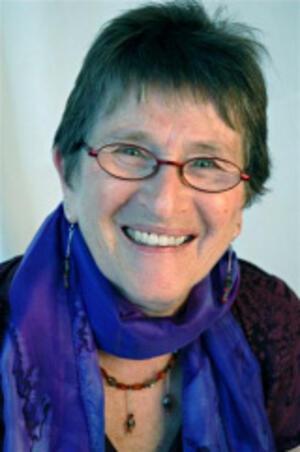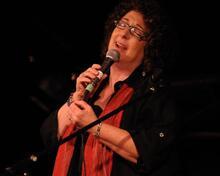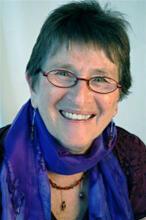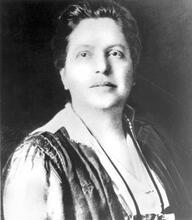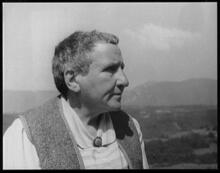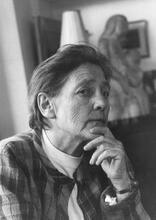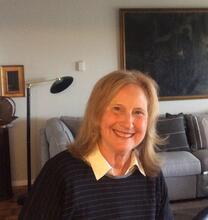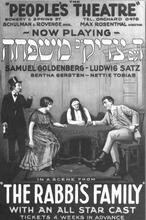Evelyn Torton Beck
Evelyn (Evi) Torton Beck is an academic and an activist, an ever-evolving Jewish lesbian who is equally at home in multiple disciplines and approaches to life, art, and cognition. Born in Vienna, she fled with her family in 1939 and survived the Holocaust by immigrating to the United States on the last legal ship out of Italy. She has a PhD in Comparative Literature from the University of Wisconsin and a PhD in clinical psychology from the Fielding Graduate Institute. She has mastered both the life of Franz Kafka and Frida Kahlo, the activism of Jewish-feminist-lesbian life, and the psychology of spiritual pursuit of self-knowledge through dance. Under Beck’s leadership, the Women’s Studies Department at the University of Maryland, College Park, became world-renowned.
Overview
Evelyn (“Evi”) Torton Beck is a multi-faceted academic, activist, and therapist who is, in the words of Bob Dylan, “Forever Young.” She is a holistic intellectual who mixes pursuits of the mind, the body, and the spirit by integrating several academic disciplines with poetry and dance; her portfolio of pursuits stretches beyond retirement.
Beck’s resume is impressive. She is Professor Emerita of the Harriet Tubman Department of Women, Gender, and Sexuality Studies at the University of Maryland, College Park (UMCP). For many years, she was also an affiliate faculty member of Jewish Studies, German, and Comparative Literature. In addition, Beck is an Alum Fellow with the Creative Longevity and Wisdom Project and a member of the Somatics, Phenomenology and Communicative Group at The Fielding Graduate University, Santa Barbara, CA.
She is a scholar, a teacher, a feminist, an innovator, a dancer, a psychologist, an outspoken Jew, and a lesbian. With her energy and drive, the Maryland flagship campus became a more welcome place for Jewish, female, and homosexual students, faculty, and staff.
Early Life and Family
Evelyn Torton Beck was born in Vienna, Austria, on January 18, 1933, to Max and Irma (Lichtmann) Torton. Max Torton was born in Buczacz, Poland; Irma Torton was born in Vienna. The family, which includes Beck’s younger brother, Edgar, fled Vienna in 1939 and survived the Holocaust by immigrating to the United States on the last legal ship out of Italy, settling in Brooklyn, New York, in 1940.
Evelyn and Anatole Beck married in 1954. Before divorcing in 1974, the couple had two children: Nina Rachel (b. 1955) and Micah Daniel (b. 1958). Nina, also a lesbian, has one child, now an adult. Micah has a biological son and a daughter adopted from Mali. Nina and her partner, Stacy Jolles, were one of three plaintiffs in the suit that established the right to “civil union” for same-sex couples in Vermont on July 1, 2000. In 2010, Nina and Stacy were married. For many years, Beck was married to her partner, L. Lee Knefelkamp, an internationally renowned developmental psychologist and scholar of higher education, who died in 2018.
Multi-Disciplinary Scholarship
Beck received her BA from Brooklyn College in 1954 and, a year later, her MA from Yale. In 1969, she completed her PhD in Comparative Literature at the University of Wisconsin at Madison. Beck was a founder of the discipline of Women’s Studies. Over several decades, she gathered material that became the basis for a second PhD, in clinical psychology, earned from the Fielding Graduate Institute in 2004. Entitled “Physical Illness, Psychological Woundedness and the Healing Power of Art in the Life and Work of Franz Kafka and Frida Kahlo,” the thesis focused on the many parallels of themes and images, especially “wounds of gender and identity.”
Beck also examined the Jewish dimension of Kafka and Kahlo’s work and its impact on their split senses of self (recently, Kahlo’s Jewish ancestry has been contested. In an article for Feminist Studies, entitled “Kahlo’s World Split Open” (2004), she explores the ways in which Kahlo made evident forms of abuse she had found “unspeakable” in her life. Another of Beck’s book projects involves a collection of her essays and speeches, combining her interest in Judaism, feminist epistemology, literature, and the arts with social activism.
Such eclectic interdisciplinary connections are the hallmark of Beck’s scholarship, which has produced two major but very different contributions to Jewish scholarship: Franz Kafka and the Yiddish Theater: Its Impact on His Work (1971) and Nice Jewish Girls: A Lesbian Anthology (1982). The latter was the first anthology of its kind, collecting poetry, essays, reminiscences, and short stories from a wide variety of women from the United States and abroad who are Jewish and lesbian.
Beck is known as the “grandmother” of Yiddish at the Modern Language Association, where she started the Yiddish section in 1972, years before the current Yiddish revival. For many years, she was an active member of B’not Esh [Daughters of Fire], a Jewish feminist think tank composed of rabbis, therapists, theologians, social workers, and scholars who, collectively, formulate theory and create new, woman-affirming ceremonies. As early as 1979, she dared call out Isaac Bashevis Singer’s misogyny in an early issue of Lilith: The Jewish Women’s Magazine (No. 6, 1979).
Since the 1970s, Beck has published countless articles and delivered many conference papers and keynote speeches around the world. She has always been a proud and assertive Jewish activist. She was instrumental in transforming UMCP into a Jewish-sensitive campus and introducing many Jewish-content courses into the curriculum. Moreover, she was one of the first to recognize the need for lesbian inclusion in Jewish circles and for Jewish inclusion in feminist circles.
Teaching and Awards
After graduating from the University of Wisconsin, Beck taught there for a dozen years. In 1984, she was recruited by UMCP to further develop its Women’s Studies Program. When she stepped down as director in 1993, the program had become one of the most respected women’s studies departments in the country, offering an undergraduate degree and a graduate certificate in women’s studies.
In 1994, Evelyn Torton Beck received the university’s Outstanding Woman of the Year Award; she received the Distinguished Scholar/Teacher Award the following year. She was on the advisory editorial board of Bridges: A Journal for Jewish Feminists and Our Friends. In May 2002 she retired from the Women’s Studies department of the University of Maryland. For her life work in interdisciplinary fields, Beck was awarded an Honorary Doctorate from the University of Music and Performing Arts in Vienna, Austria, in 2021.
Selected Works by Evelyn Torton Beck
Website
Books
Nice Jewish Girls: A Lesbian Anthology. Watertown, MA: Persephone Press, 1982. Reprinted by The Crossing Press, 1984. Revised and Expanded Edition, Boston: Beacon Press, 1989.
The Prism of Sex: Essays in the Sociology of Knowledge, edited with Julia A. Sherman. Madison, WI: University of Wisconsin Press, 1979.
Interpretive Synthesis: The Task of Literary Scholarship, with Jost Hermand. New York: Frederick Ungar, 1975.
Kafka and the Yiddish Theater. Madison: University of Wisconsin Press, 1971.
Selected Essays
"The Politics of Jewish Invisibility." NWSA (National Women's Studies Association) Journal, (Autumn 1988), 1:1, 93-102.
"Therapy's Double Dilemma: Misogyny and Anti-Semitism." In Jewish Women in Therapy: Seen but not Heard, edited by Rachel Josefowitz Siegel and Ellen Cole, 19-30. New York: Haworth Press, 1991. Also in Women & Therapy,10:4:19-30.
“Lesbians in Psychoanalytic Theory and Practice: A Review Essay,” with Susan (Shanee) Stepakoff; Feminist Studies, 26:2 (Summer, 2000): 477-495.
“Integrating Jewish Material into the Teaching of Psychology,” with L.Lee Knefelkamp and J. Greenberg; In Teaching Gender and Multicultural Awareness: Resources for the Psychology Classroom, Eds. P. Bronstein and K. Quina, 237-252. Washington, DC: American Psychological Association, 2003.
“Kahlo’s World Split Open.” In Feminist Studies 32:1(Spring 2006): 54-81.
“On being a pre-feminist feminist OR How I came to Women’s Studies and what I did there.” In The Evolution of American Women’s Studies: Reflections on Triumphs, Controversies, and Change, edited by A. Ginsberg, 117-130. New York: PalgraveMcmillan., 2008.
"Diana Kurz's Holocaust Paintings: A Chance Encounter That Was No Accident.” Feminist Studies 35:1 (Spring 2009): 80-100.
“The Transformative Power of Sacred Circle Dance.” Handbook of Phenomenology; Ed. Valerie Bentz and James Marlatt. Santa Barbara, CA; Fielding University Press (forthcoming 2021).

